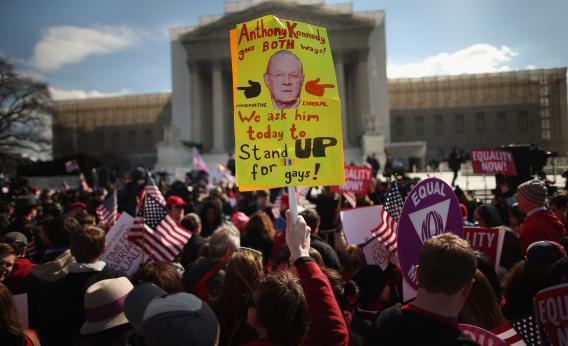The first big story to come out of United States v. Windsor was the saga of Paul Clement. When the case got to the court, the White House refused to defend the Defense of Marriage Act. The House of Representatives retained Clement to defend the law (via the Bipartisan Legal Advisory Group of the United States House of Representatives), and after an outcry, Clement switched law firms. “Defending unpopular clients is what lawyers do,” said Clement. He was applauded, even if the House Republicans weren’t.
And boy, they really weren’t. The House’s odd decision to jump in and defend the law was dealt with over long agonizing minutes in today’s hearings. It was an argument about standing, in part, but it carried a tone of real derision.
CLEMENT: [It] would be a strange jurisprudence that says that the House has standing to come in and defend an unconstitutional one-house veto, but it doesn’t have standing to come in and defend its core Article I prerogative, which is to pass statutes and have those statutes --
JUSTICE KENNEDY: Well, that – that assumes the premise. We didn’t – the House didn’t know it was unconstitutional. I mean -
MR. CLEMENT: Well, with all due respect, Justice Kennedy, I think the House -
JUSTICE KENNEDY: We are talking about ex ante, not ex post, what is standing at the outset? And the House says this is constitutional.
The House does say that. Last week, John Boehner rejected that the idea that the administration can “decide what’s constitutional” and which laws don’t need defending. Elena Kagan, the newest member of the court, got in a dig at the reasoning that the House (including a younger, less powerful Rep. John Boehner) used to justify the law.
JUSTICE KAGAN: Well, is what happened in 1996 – and I’m going to quote from the House Report here – is that “Congress decided to reflect an honor of collective moral judgment and to express moral disapproval of homosexuality.” Is that what happened in 1996?
MR. CLEMENT: Does the House Report say that? Of course, the House Report says that. And if that’s enough to invalidate the statute, then you should invalidate the statute.
Clement’s point was that the court didn’t tend to rule based on that sort of addendum. But if the White House’s punt was supposed to delegitimize the support for DOMA, it worked.
Read more from Slate’s coverage of gay marriage cases at the Supreme Court.
